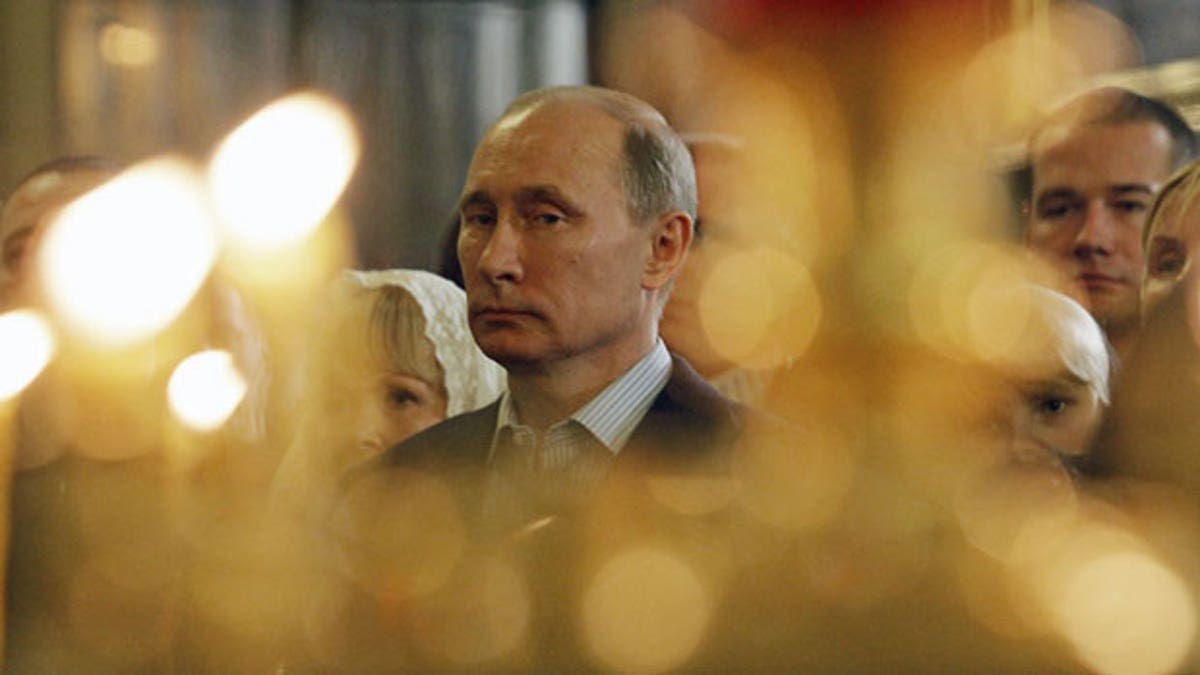
Vladimir Putin attends a Russian Orthodox Christmas service in 2012. (AP)
As a religious television network, Spas TV wouldn't have seen the light of day in the old Soviet Union. But it is poised to become a spiritual -- and political -- powerhouse in Russia by beaming into tens of millions of homes with the likely blessing of President Vladimir Putin.
The satellite television channel affiliated with the increasingly powerful Russian Orthodox Church has filed with the government ministry that oversees television frequencies to go national. Boris Kostenko, director of Spas, which means "Savior," told Kommersant the channel will be reformatted "technologically and thematically" to attract a wider audience. While it is expected to remain heavy on religious programming, it could become a formidable force politically by blending those themes with a conservative agenda.
"[The channel will feature] daily shows with discussions aimed at young, thinking, soul-searching people," Kostenko said.
[pullquote]
Launched in 2005, Spas TV claims to have an audience of about 10 million households in Russia. Funded with donations from Orthodox businessmen, it features talk shows and educational programs that have criticized evolution and railed against such Western ideas as liberal democracy, feminism and gay marriage.
While it may seem strange that a former KGB agent who spent most of his life in a communist and aggressively non-religious police state would form an alliance with the church, experts say it makes perfect sense, at least politically. Putin backs the church, which in turn calls him a "God-given leader," because he believes it is part of a national tradition, not to mention some 71 percent of the Russian population consider themselves members.
Since the collapse of the Soviet Union in 1991, the Russian Orthodox Church has been completely revamped after being virtually nonexistent under decades of communist rule.It has gone from an underground vestige of the era of czars to a galvanizing political force.
“The rebuilding of the Russian Orthodox Church has been massive,” Paul Valliere, a Butler University professor of religion told FoxNews.com. “It is like a completely different country than it used to be because the church, it is back. The church has a role of visibility in almost every sector of life.”
Though only a minority of Russian Orthodox Christians attend church regularly, Valliere said the change over the last 25 years has been, “nothing short of spectacular.”
“There is no question the Russian Orthodox Church is here to stay,” he said.
According to the Pew Forum on Religion and Public Life, 101.1 million people identified as Orthodox Christians in Russia, making up 71 percent of the population.
As the church has become increasingly prominent, it has developed an alliance with Putin. Dale Herspring, a Kansas State University political science professor and foreign policy expert, believes each side has its reasons for developing such a relationship. He told FoxNews.com the praise from the Orthodox Church comes from its historical secondary presence to government.
“The Orthodox Church has long been subordinate to the state,” he said. “This does not mean that the Church is not prepared to raise issues. But when the state has made a decision, the issue is resolved.”
Herspring noted that the church can hardly spurn a onetime apparatchik of the secular state, given the Christian belief of redemption. As for Putin, Herspring believes his backing of the church is at least partly political.
“He has long had a soft spot for the Church,” Herspring said. “He wore a cross even while he was a KGB officer (given to him by his mother). He has been seen often in church since the end of the USSR.
“I wouldn't call him a religious fanatic, but I think he sees the church as part of Russia," he said. "He believes strongly in the country's "Russianness" so he believes in the Church.”
